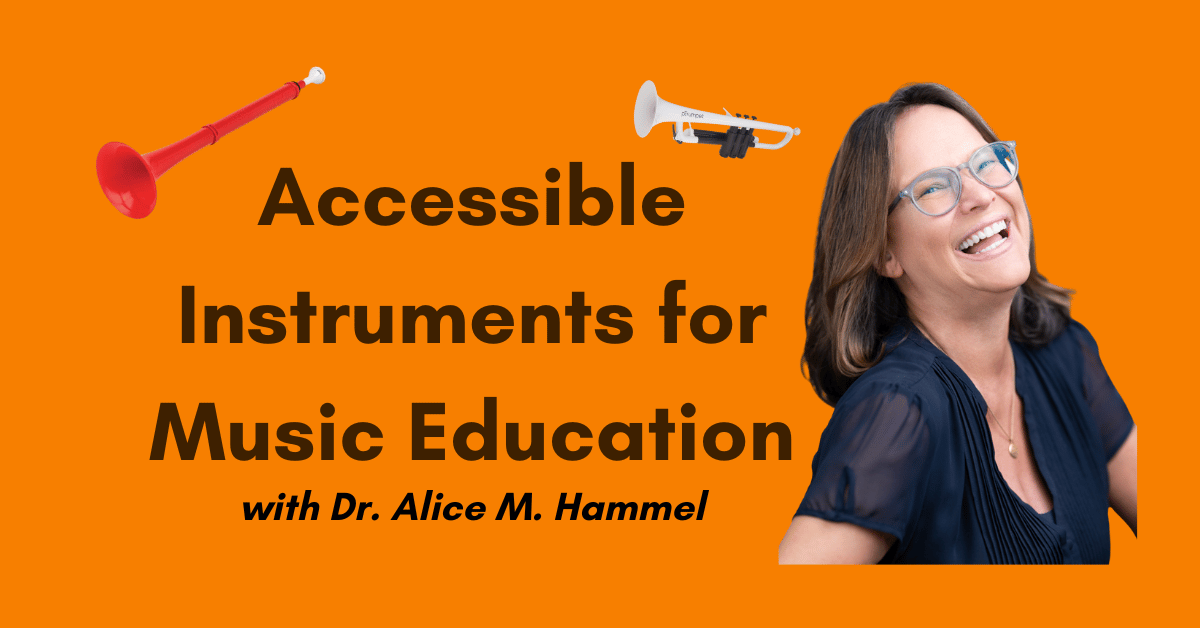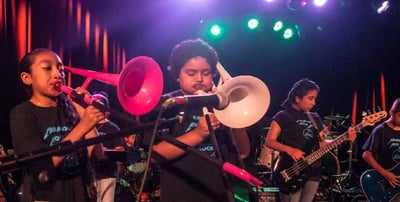

January 17th, 2024
3 min read

In this article, Dr. Alice M. Hammel from James Madison University discusses pInstruments and their place within music education for students with differences and disabilities.
Music Will (Modern Band) has many appropriate adaptation and modification ideas for students who learn differently. pInstruments fit well within this construct as their instruments are made with accessibility in mind. While attending the Modern Band Summit in Fort Collins, CO (July 2023), I was introduced to these student-centered instruments. I began to think of the opportunities for adaptations (size, color, pacing, and modality) as well as modifications (changes that may be necessary for students who need them) inherent within these instruments.
These high-quality plastic instruments are already focused on accessibility in cost as well as inclusive features that assist students who learn differently. Placed within a heuristic of adaptations we can see how efficient they are at providing these accessibility options.
Size
Color
Pacing

When thinking about what could be next, I considered ways pInstruments could be made even more inclusive. Some ideas include:
We are all seeking ways to provide the best musical education possible for as many students as we can reach. pInstruments fill a very real void in beginning instrumental music as they begin with the pCorder and pBuzz as pre-band instruments.
Both these options are terrific for young students. Some students are not able to manipulate the holes on a recorder. The pBuzz is a great option as some (or all) students in the class can play an instrument that teaches buzzing, slide positions, some Western musical notation, and the joint attention necessary for group learning in a musical setting.
The pCorder is unique as it is much easier to play than traditional recorders. The antimicrobial feature is also a game-changer for young musicians.
The pBugle, pCornet, pTrumpets (there are several types of trumpets), pBone Mini, and pBone are all innovative choices in beginning instrumental settings. The price point is particularly helpful as many students are priced out of instrumental music when they are not able to pay the rental or purchase cost of a trumpet or trombone.
The mouthpieces and instruments are constructed to provide instant success and students can be playing tunes on the very first day. For students who have struggled to learn in school, this can be life-changing as they find a place where they are valued and can be successful – just like all the other students.
I highly recommend music educators look at these resources and consider them for their accessibility and inclusive qualities.
You and your students will enjoy these novel instruments and the teaching videos that encourage us to remember why we started playing instruments in the first place. Hint – because it is fun!
Dr. Alice Hammel, 2023 National Association for Music Education (NAfME) Lowell Mason Fellow, Virginia Music Educator Association Outstanding Educator (2018), and current President of the Virginia Music Educators Association, is a widely known music educator, author, and clinician whose experience in music is extraordinarily diverse. She is a member of the faculty of James Madison University and has many years of experience teaching instrumental and choral music in public and private schools.
Dr. Hammel has put these varied experiences to great use while compiling a large body of scholarly work. She is a co-author of four texts: Teaching Music to Students with Differences and Disabilities: A Label-free Approach, Teaching Music to Students with Autism, Winding It Back: Teaching to Individual Differences in Music Classroom and Ensemble Settings, and Teaching Music to Students with Differences and Disabilities: A Practical Resource. Dr. Hammel is Past-President of the Council for Exceptional Children – Division for Visual and Performing Arts Education and was recently awarded their Past President Award for Excellence.
Dr. Alice Hammel, 2023 National Association for Music Education (NAfME) Lowell Mason Fellow, Virginia Music Educator Association Outstanding Educator (2018), and current President of the Virginia Music Educators Association, is a widely known music educator, author, and clinician whose experience in music is extraordinarily diverse. She is a member of the faculty of James Madison University and has many years of experience teaching instrumental and choral music in public and private schools. Dr. Hammel has put these varied experiences to great use while compiling a large body of scholarly work. She is a co-author of four texts: Teaching Music to Students with Differences and Disabilities: A Label-free Approach, Teaching Music to Students with Autism, Winding It Back: Teaching to Individual Differences in Music Classroom and Ensemble Settings, and Teaching Music to Students with Differences and Disabilities: A Practical Resource. Dr. Hammel is Past-President of the Council for Exceptional Children – Division for Visual and Performing Arts Education and was recently awarded their Past President Award for Excellence.